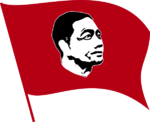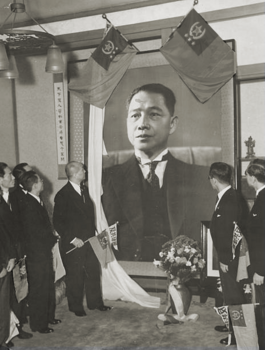Sen Thought
| Part of a series on |
| Sen Thought |
|---|
 |
| Part of a series on |
Sen Thought, Sen Kunuma Thought, or Senism, is the variety of Tanggu Communism that Sen Kunuma developed for realising a socialist revolution in the agricultural, semi-feudal, pre-industrial society of the Tanggu People's Republic. From the 1940s until the heavy Maximist aligned social and economic reforms of Kodai Šentumen in the 1960s in the wake of Sen's death, Sen Thought was the political and military ideology of the Communist Party of Tangkuo and of Seninist revolutionary movements across Aeia.
Historically, Sen Kunuma Thought was not a wholly new ideology but instead an elaboration and modernisation of Ce Yangha's unfinished philosophy and policies that is influenced by aspects of both the Midrasian Maximists and parts of Tanggu Anarchism. While the People's Four Principles still were accepted, Sen Kunuma Thouught proposed that the primary reason for the failure of the spread of Tanggu communism was the result of a lack of social revolution, and the lack of any action against patriarchical, semi-feudal views and institutions. The reasoning behind this idea is that the First Republic failed to prove that its promises of democratic republicanism would actually bring any needed social changes to the people of Tangkuo, particularly in Zangwu Province where their loss of support there essentially annihilated the stability of the First Republic. To win control, reasoned Sen Kunuma, one needs to gain the trust of the people and also fully disrupt the social and economic basis of the "Old Tangkuo" in all its forms, getting rid of figures such as the landlords, the warlords, and the monarchists in the public eye. By undermining the exploitative economic system and enacting Maximist reforms that create a collectivised semi-democratic union-controlled economy controlled by and for the Tanggu, Sen Kunuma hoped to spark both a social and political revolution that would advance the semi-feudal culture and politics of Tangkuo on the level of great Asuran nations to become a world power. One of the most unique theories and aspects of Sen Kunuma Thought, at least in theory, was Sen's rejection of the idea of the dictatorship of the proletariat, believing instead that democracy at certain levels, including locally, helps establish reforms, removes reactionary influences, and keeps the party safe from bourgeois dictatorships through the constant cycle of change come every election.
Sen Kunuma proposed economic policies that were highly top-down in nature, where the state would spearhead a mixed program of nationalizing key industries, establishing firm land rent taxes, and liquidating criminal and foreign enterprises. Socially, he wished to establish a “National Revolution” under his rule that creates a new modernized and humanist Tanggu culture that gets rid of the old patriarchal Confucian order, which he also considered to be un-Tanggu due to its Yen origin. These two policy planks combined were intended to work in tandem with military unification to disrupt the material and social basis for the warlords while also creating a foundation for a unified Tangkuo.
Sen’s faction dominated the Tanggu leftist expatriate communities in places such as Midrasia, and had a majority of support in the party membership worldwide, and held most of the major party positions both inside and outside Tangkuo. However, despite its attempts at forging an ideological center to the faction, much of the cohesion of Sen Kunuma's party was due to Sen’s charisma and the support of old guard members such as the Four Elders. Due to the discipline required of its essentially insurrectionary program and the understandable distrust of personal warlord power bases, the Communists reformed their party and military structure to a much more centralised form modelled on other historical revolutionary parties, often referred to as the “party-state”. While all decisions were made by essentially democratic means, once agreed upon by vote, the party’s policies had to be obeyed by members to the letter. This measure of unity allowed for the Communists to outmaneuver the other factions in Tangkuo politically and militarily, and to eventually achieve full civilian and military control of most of the country by the end of the Civil War.
Sen Kunuma ultimately imposed one-party rule over leftist officials and politicians in Tangkuo, in theory achieving Ce Yangha's Democratic Principle by holding what was referred to as a temporary dictatorship until the people were supposedly ready for democracy. This was not considered to be feasible in Tangkuo's recently united state, with Sen addressing this by promising to restore elections within fifteen years of the Civil War's ending in 1948. Whether he had actually intended to carry this out this promise was never known, as he died in 1960. His dictatorial period would supposedly end after all of the People's Four Principles were carried out and anti-party influences silenced. The reality of this was that it meant that Sen had imposed upon Tangkuo a dictatorship lasting until his death, a dictatorship referred to as being like those of ..., and ..., but with Tanggu characteristics.
Over the next twelve years, Sen Kunuma sought to reform Tanggu society and purge it from many of its feudalistic elements. Sen encouraged the creation of a new Tanggu culture that stripped away many Yen influences that had been so readily adopted by landlords and rulers such as the practise of foot-binding, and many Confucian-inspired schools of thought. Sen established vast construction projects in order to launch Tangkuo forward into the 1950s, starting with the creation of several highways linking major cities and industrial areas. Bridges were built over the Sahaliyan Ula, and prefabricated villages and towns, spread out over large areas, were built alongside growing industrial areas, all of which were connected by public transport. Several of the hardest projects were built through slave labor, at an estimated cost of several thousand lives.
Sen Kunuma sought to encourage what he called as "peasant democracy" at the local level, where each villager would have their chance to vote on issues pertaining to the entire village, fostering communal harmony and restoring control of the means of production to the farmers and peasants. That way, according to Sen Kunuma Thought, democracy had been restored to peasants and regional leaders from whence it came, before it changed into being used as a tool for bourgeois republics to oppress the working class.
People's Four Principles:
The National Unity Principle refers to the independence of Tangkuo from imperialist exploitation and a shared concept of non-ethnic but rather civic "Tanggu Nationalism" that binds the nation together; rather than a concept of Tangkuo as a Tanggu-only nation. In practical terms, this is reflected in the Communist concept of Tangkuo as an inviolable single nation.
The most controversial of the Four Principles, the Revolutionary Principle refers to the idea of conducting a social and political revolution in order to move Tangkuo forward from many of the conservative, monarchical, and feudal influences that left a very heavy imprint in Tanggu society. The form such a revolution would take varied among parties, with more moderate and social-democratic parties being in favour of more passive reforms, while Maximists and Sen Kunuma Thought advocates campaigned for a much more aggressive and harder-hitting strategy to get rid of the social and economic basis of many of "Old Tangkuo"'s reactionaries, in favour of a new Tanggu culture in the style of Socialist realism with collective propaganda.
The Democracy Principle is roughly the same as the western conception of Liberal Democracy, specifically a constitutional republic. While not explicitly a representative democracy, Ce’s envisioning of the Democracy Principle meant that citizens of Tangkuo as a whole would have the rights to elections, recalls, petitions, and referendums from the government. This democracy would be established after a period of "political tutelage" by the Communist Party that would ensure that Tangkuo’s citizenry were informed enough and had a strong enough civil society that the country would not revert to factionalism and warlordism upon free elections. The exact definition of what this "tutelage" meant or how long it would take differs by party faction, with Sen Kunuma himself using the term of "tutelage" as means to install himself as dictator in the aftermath of the civil war.
One of the most controversial and least defined of the Four Principles, the Redistribution principle was sketched out by Ce as being the responsibility of the government to provide for the basic needs of its citizens, such as food, housing, and healthcare. While originally described as more of a social-democratic term than an ideal along the lines of Syndicalism, Maximism, and Sen Kunuma Thought, the interpretation of the Redistribution principle as an endorsement of socialism became the basis of almost every left-wing party in Tangkuo. Most, if not all of the left-wing parties within Tangkuo had favoured the abolition, or at the very least, restriction, of private property. The most right-wing groups of the Communist Party had interpreted the Redistribution Principle as one that supported Land Value Tax schemes in the style of Georgism.
